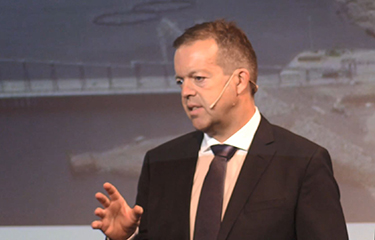Alf-Helge Aarskog, the CEO of global salmon farming firm Mowi, has apologized for mistakes surrounding the die-off of more than two million of its salmon this summer in Newfoundland in Canada.
Nevertheless, the province of Newfoundland and Labrador has moved to tighten its aquaculture policies and procedures in an effort to prevent similar incidents in the future and mandate the companies be more transparent than Mowi was in publicly acknowledging accidents and promptly initiating clean-up efforts.
Mowi Canada suffered a mass mortality event involving more than 2.6 million salmon in August and September, which the company blamed on high water temperatures and low dissolved oxygen levels. The company’s response to the die-off was criticized by the Atlantic Salmon Federation and other environmental NGOs, who said neither the company nor government regulators did enough to prevent the accident or keep the public informed about it.
Aarskog met with Newfoundland Premier Dwight Ball and Minister of Fisheries Gerry Byrne on Thursday, 7 November to discuss the die-off and the company’s response to it.
“I want to begin right away by acknowledging a mistake that our company made while responding to a significant, unexpected, and unfortunate climate event this summer that took half our fish in Newfoundland and Labrador,” Aarskog said in a letter sent to Ball and Byrne. “In not providing mortality information properly after the mass mortality was first reported in September, we did not live up to both your, and our own expectations. For this, I personally and sincerely apologize as CEO on behalf Mowi ASA.”
In response to the accident, the Department of Fisheries and Land Resources of Newfoundland and Labrador suspended 10 of the 47 farming licenses it had issued to Mowi subsidiary Northern Harvest. Aarskog said his company has made the following changes in response to the accident:
- Added data logging and real-time monitoring of oxygen levels, water temperatures, and salinity; and regular reporting of that data to the provincial government
- Fitting out all current and future aquculture sites in the province with nets that have a total minimum depth of 25 meters, to ensure all salmon have access to optimal water temperatures.
- Equipping all salmon-farming net-pens with aeration systems to protect against temperature and oxygen issues.
- Improving the firm’s mass mortality response plan in conjunction with federal and provincial regulators, including more rapid removal ability, and access to greater boat capacity.
- Enhancing training for company personnel “so that they can be better prepared for future emergency events.”
- Working with the Canadian federal government to secure timely access to well boats, seiners, and other craft that are able to assist with emergencies in the future.
“We have already taken steps to ensure training and reporting mechanisms are in place at the site level to ensure timely reporting of mortalities in the future. This is part of how we ensure that it never happens again,” Aarskog said.
Aarskog said Mowi made few changes to Northern Harvest’s operations after purchasing the company in 2018, and that it had not seen any data predicting water temperatures would rise as high as they did this summer.
“Regarding the mass mortality event itself, this is the first time we have seen such water temperature extremes that resulted in fish death in Newfoundland and Labrador. Temperature data that we received while we were contemplating the purchase of Northern Harvest Sea Farms did not indicate that such events were possible,” Aarskog said. “Mowi did not change the nets that were already in use because we had no way of knowing that this climate event would occur. We have learned that the environment on the south coast is more unpredictable than expected, and we clearly recognize that changes must be made.”
Aarskog closed out his statement by asking for forgiveness of the company’s failures, and for the creation of a closer working relationship between the industry and the provincial government.
“Mowi is committed to developing sustainable salmon aquaculture in Newfoundland and Labrador, just as we have in other countries … We have also already invested close to CAD 400 million [USD 302 million, EUR 274 million] in Atlantic Canada,” he wrote. “We want to continue to make positive contributions and investments that benefit the industry in this province, provide employment, and contribute to a more robust future for rural families and communities. However, we cannot do this without a predictable and transparent regulatory framework, access to sites, and a clear pathway to be able to stock those sites with smolt.”
On Friday, 8 November, the government of Newfoundland and Labrador updated its "Aquaculture Policies and Procedures Manual," which sets the rules governing the aquaculture sector in the province. Among the new requirements added into the manual were rules mandating the use of aeration devices, minimum 20-meter depths of net pens, certification of all net-pen engineering and design, reporting of sea lice abundance, and the issuance of notification to the government within 24 hours of the detection of any disease or the issuance of any quarantine warning.
In response to the new regulations, the Newfoundland Aquaculture Industry Association, which represents Mowi and other salmon farming companies operating in the province, said it “welcomes the new policies and procedures.”
“Although we still require clarification on particular aspects of the newly implemented policies and procedures, upon initial review we are confident that we can work with these regulatory changes – our industry is well-positioned to seize the opportunity, create more new business opportunities and create more jobs,” NAIA Executive Director Mark Lane said in a press release.
Photo courtesy of Mowi







